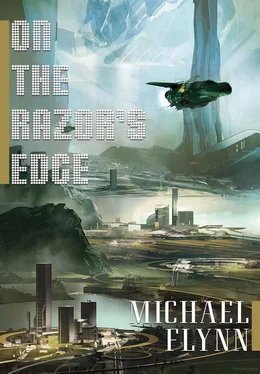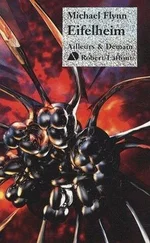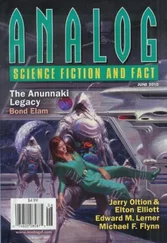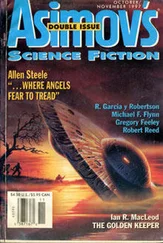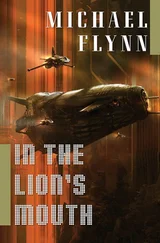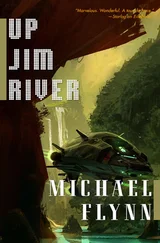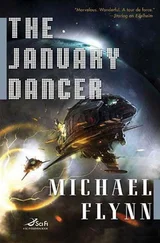This time the voice seemed to come from the darkness of the common room, just outside her doorway.
“Gwen told me her name.”
Your mother’s daughter cannot be so naïve as that.
“How … How many did Mother bring? Or is this a sending and not a bringing?”
Enough and not nearly enough. We have not all come only for you, child. There are other prizes to be plucked. You will not know our numbers or our names, lest these fall out of your memory onto your tongue. Or, worse, be pulled there. Know only that we go to Terra before you and behind you and beside you. But you must tell us one thing. Why has she stopped here?
Méarana hesitated. There were others, not Hounds, who might want to know Ravn’s plans.
“How do I know I can trust you? You might be rival Shadows, or even Names!”
The intercom clicked on and the voice whispered over it. “Would Shadows or Names have approached you thus? Let our stealth be our assurance. There have been two close calls already, and we’d not court a third.”
“You won’t show yourself—”
“—because you cannot describe what you’ve never seen.”
“I wouldn’t tell Ravn.”
The laughter that greeted this reminded Méarana of the barking of a mastiff. It was short, low, huffing. “I do not underestimate Ravn Olafsdottr. Take grave care that you do not. But let this be a surety. An ancient banner bears a bloodstain that must never be expunged.”
That ancient banner hung from the rafters of Clanthompson Hall. Méarana exhaled a long-held breath. “All right. We came here to secure the aid of Domino Tight in our attack on Gidula’s stronghold.”
“Ah,” the intercom breathed. “Domino Tight. Three snowballs’ chances. Success is now assured.”
“Three, plus however many you represent,” Méarana retorted with grave assurance. “How do you know that Ravn has no recording devices planted in these rooms?”
A little late to think of that, child. (The voice came again from the common room, and it seemed to Méarana as if that room was growing less dark.) She has, but her recordings will tell her nothing. There is one further boon that we would ask of you, but only if it can be done without arousing suspicions. Learn what you can from Domino Tight about the Vestiges that his paramour guards.
“I’m not sure I can do that, Voice. Voice?”
But there was no answer. The tapestry was still. The sound of the distant machinery, muted. The lights returned slowly to their normal brightness. The sweetness in the air was gone.
Méarana lay back on the bed, fighting tears. They had not come for her at all. They had come for the Vestiges. She had been shown once more her place in the scheme of things.
Later, when Ravn returned to the rooms with Domino Tight’s reply, she saw the harper lying in her bed, weeping. Ravn did not ask why. But she did sniff the air and frown at the subtle tang.
VIII. One Man with a Dream, at Pleasure
Prizga sits on a long, narrow hill whose blunt end overlooks the gorge of the rushing Qornja River. To the east lies a bowl valley rich with farms. To the west the river snakes across a broad scrubland toward a delta twelve miles distant. Lazarus species roam this plain: go-beeshon and go-camels and the like. A long, graceful bridge spans the gorge. Supported entirely by gravity grids, it hangs faerielike in the air.
Prizga ATC tells Donovan that the local weather is cool today, but from cruising altitude Donovan spies the white of the northlands. In the future, it seems, Prizga will grow cooler still.
* * *
After departing the ice cap, Donovan had crossed first a thin, tall-grass prairie and then a polar desert before entering the defiles of immense mountain ranges, dressed in fir and spruce but punctuated also with the quaking golden leaves of aspen. After that, he had headed due west over a temperate semidesert until he struck the coast and turned north into the traffic corridors for Prizga.
In all that time, he had not seen another city.
There had been towns scattered on the grasslands, cheerful lights glowing in the night beneath him. But mountain and desert had been devoid of all signs of human habitation. Glacial pockets in the high mountains had caught the starlight and twinkled false images of house lamps, creating faux cities on the ice fields. Now and then, his general receiver had caught snatches of music, so he supposed that villages or mining towns snuggled unseen in the black crevasses, but never anything even as large as Ketchell until he entered the airspace over the Southwestern Desert.
He passed over great circles of greenery, crops conjured from the arid soil by the constant drip-drip of spidery irrigators that spread like steel webs from the morning-flushed towns at their centers. But the first such installation he had seen after leaving the mountains had been rusting in the fields and the town at its heart abandoned and clatterdown.
It was hard to imagine that this world had once ruled the stars.
* * *
But Prizga proved a bustling, friendly city, larger than Ketchell, and, unlike her east coast counterpart, she still squatted upon an anciently urban site. Beneath the modern city lay the broken plasteel and metaloceramic of earlier settlements, and beneath those, fragments of concrete block, broken marble, and the rusty stains of iron rebar. And beneath even that, pieces of wood that scholars felt had once been cut and shaped into boards.
The latter claim was still controversial, and the scholars were limited in their exhumations. Save where happy excavation revealed the bones of the city, the layered ground of Prizga was paved over. To most of the inhabitants, the rubble beneath their feet was a “jinko nuisance,” and much of it had long disappeared into ballast, recycle, or scrap sales. The major exception was the ruins poking like iron trees from the soil of the agricultural basin. These were simply too massive to remove, and the farming co-ops had programmed their autoplows to wind around them. The spars and girders were still known by their ancient Murkanglais name: the elfwendevaxii and the basin as a whole was called the vaxi’prizga.
Donovan rented a hotel room using the name on one of several ID cards he had prepared for the trip, and spent his first day in town visiting the ruins. Afterward, he took a leisurely dinner on a terrace restaurant overlooking the Qornja gorge. The sound of the rushing water, muted by the mist that rose out of it, soothed him insensibly into sleep.
* * *
He hurries down a darkened stairwell. Quietly, because the enemy may have already infiltrated the building. He passes dim and empty offices, long looted of anything of use, littered with casings and sabots and exhausted battery packs, and here and there too the corpses of those who came to seize the offices and those who had defended them.
He pauses at the broadcast studio to beckon to Issa Dzhwanson, the silver-throated actress, idol of millions, who has been for these past few days the clarion voice of their futility. But she shakes her head and like the men and women left behind on the rooftop will not leave her post. “I will maintain the illusion,” she tells him. “I will tell the world that reinforcements have come, not that the remnants have left. I will sow doubts in the mind of the Protector.”
“I cannot tell you where I’m going,” he says. “Any lips can be brought to speak.”
“They’ll not take me.” She laughs. “Go, and go quickly. If you do not escape, it will not matter that we ever fought.”
There is not time even for a last kiss. He makes his way into the subbasement, where he scrounges in the maintenance shops for something that can hack and dig and chop. The blocks are ceramic and hard to break, but once through the surface facing progress is easier. He wonders how thick the wall is. Will the Protector’s men enter the building to seize it or simply stand back and bring it down, as they brought down the Chancellory? Seventeen stories tower above him. There would be time to realize that it was all coming down to crush him.
Читать дальше
